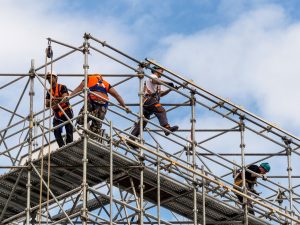 There are countless ways of being injured on a construction site. One of the most common forms of injury, and one of the least talked about, is fall injuries resulting from poorly constructed scaffolding. In fact, according to a report by the Occupational Safety and Health Administration, falls on construction sites made up 38 percent of all occupational deaths in 2015.
There are countless ways of being injured on a construction site. One of the most common forms of injury, and one of the least talked about, is fall injuries resulting from poorly constructed scaffolding. In fact, according to a report by the Occupational Safety and Health Administration, falls on construction sites made up 38 percent of all occupational deaths in 2015.
Life-Impacting Injuries
A fall from scaffolding can cause serious life-altering injuries and trauma. The physical injuries of a fall can include:
- Brain Injuries
- Spine Injures
- Broken Bones
- Lacerations
- Ruptured Internal Organs
Strict regulations exist to ensure companies properly erect scaffolding, and train employees how to stay safe. However, some companies chose to ignore these laws and works become hurt as a result. While the police and other regulatory agencies may seek litigation in these situations, only responsible construction injury lawyers will fight for your right to compensation.
The Role of Construction Injury Lawyers
There will be many questions after a workplace injury occurs that only an experienced construction injury lawyer could answer, especially when concerning a fall from scaffolding. One such question will be; who is responsible?
Though this may sound like an easy question, keep in mind that worker compensation laws prevent a worker from suing his employer if the employer has workers comp insurance. On the other hand, if a third party was responsible, like the scaffolding manufacturer or if another company set up the scaffolding for your employer, we may be able to bring a third party personal injury lawsuit against that defendant.
Third party personal injury claims are complex and may take time to resolve. However, they also offer the potential for more compensation to the victim than workers’ compensation benefits.
Regardless of who is at fault, if your injury happened in New York City or Long Island, please call the attorneys at Panzavecchia & Associates, PLLC, at 888-LAW-2204 as soon as possible to learn more about your rights and potential compensation.
